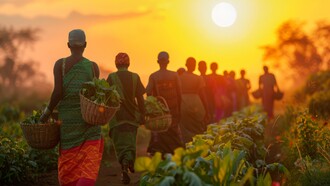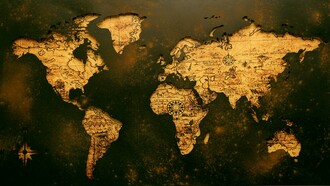Feature documentary offers intimate look at former Secretary General Ban Ki- moon and the future of the United Nations.
Produced by Bright Leaf Pictures and Cinema for Peace in association with Star Entertainment GmbH, “The Quiet Diplomat” centers on the eighth United Nations Secretary General, Ban Ki-moon. After the UN helped him and his family during the Korean War, Ban Ki-moon was inspired to become a man of peace. During his two terms as Secretary General, he discovered the challenges of international diplomacy in an increasingly splintered world while finding his stride as a champion of women’s rights, LGBTQ lives, and climate change.
“The Quiet Diplomat” was executive produced by former UN television and video section chief, Chaim Litewski, and Cinema for Peace founder, Jaka Bizilj, along with Michael B. Kim and James Yoon.
Directed by Charles Lyons and produced by Susan Lee MacDonald with Lyons, it had its world premiere at Cinema for Peace’s annual World Forum on the Future of Democracy, Tech, and Humankind in Berlin,Germany, on February 18.
The film documentary director Charles Lyons spoke to MEER Magazine about “The Quiet Diplomat."
“The Quiet Diplomat” is a biographical documentary where the main character tells his own story. Why did you decide to take this kind of narrative approach?
As a subject for a documentary, Ban Ki-moon is challenging. He’s used to being private, to holding his cards close to the vest. When we went to South Korea to interview him, I had dozens of questions prepared but I quickly realized that on a given day we were only getting to a small number of them. Ban uses questions as jumping off points to tell stories about his life, and he has a lot of good ones! He's very skilled and crafty in his responses; he’s not going to answer something he doesn’t want to answer. He’s not going to give easy answers. Instead of getting frustrated by not getting what I wanted, or thought I wanted, I started to realize I needed to build Ban’s character based on what he does tell us, and how he tells it. I told Tamiris, my excellent editor, to look for the revealing moments in the hours of interviews, the beats when he seems most himself. So, we were looking for behavior, but we were also looking for language. Taken together, both reveal character. I couldn’t get Ban to say and do what I wanted him to say and do, but I found the closer we honed to his words, to what he actually said about his own life, the more intimate the documentary could become. Having Ban narrate his own life was my attempt to create a more intimate portrait when in reality Ban as a person can seem impenetrably distant.
How did you get the idea of making a documentary about the former secretary general of the UN, Ban Ki-moon?
During Ban’s tenure at the UN, I had made several short films for the UN as a freelancer under audio-visual section chief Chaim Litewski, who would later become a close friend and the EP of this documentary. He sent me to make human rights films in Japan, India, and Brazil. So, I was familiar with both Ban and the UN system. A few years after I worked for the UN, my sister, the book agent Jennifer Lyons, shared an early draft of Ban’s memoir, which she was representing. I read it quickly. I was struck by the remarkable arc of Ban’s life—from a displaced person with his family during the Korean War, helped invaluably by the UN—to the head of the organization that had given his life such needed help when he was a child. Ban is one year older than the UN itself; I felt telling his story could be a lens through which to re-evaluate the UN at a time when many people are questioning its effectiveness nearly 80 years after its formation.
You seem to have had a lot of access to the Secretary General. Is that because he trusted you? How did you convince him to give you so much access to his private life?
I’m glad it looks that way! Ban seemed to open up to us over the course of filming, and credit is equally due to Susan Lee MacDonald, my producer, who is half-Korean and was very helpful during both of our trips to Seoul. I could see that Ban and his wife were especially comfortable with Susan, so in some instances, she filmed in their apartment without me! A director has to know when it’s time to get out of the way!
To what extent is the documentary based on Ban Ki Moon's book “Resolved: United Nations in a Divided World”? Did you more or less follow the book's main themes?
I was very happy to have optioned the rights to the memoir, but in truth, it’s a rich book that provides enough material for multiple episodes of a documentary, so the book was just a jumping-off point. I focused my questions on what I considered to be the important flash points of Ban’s tenure at the UN and his life itself. Then we molded what we had shot, rather than working so much from the book.
The documentary describes many of the world's biggest crises during Ban Ki-moon's lifetime, from his own personal experience as a child during the Korean War to Haiti, Syria, climate change, etc. How were you able to weave global history and his own personal history running in parallel through your film?
The Korean War, Haiti, Syria, and climate change make significant contributions to the film because my interviews with Ban revealed how important these challenges were to him. Character is revealed as much through Ban’s failures as successes, and it’s clear the Secretary General had significant regrets about Syria, for example, for which he told me he had hoped he could do more.
Why did you decide not to have "political actors" (diplomats, heads of state) talk about Ban Ki-Moon in your film?
When considering which ‘characters’ to interview in the film, I was most interested in neutral stake-holders, such as Richard Haass or Mark Malloch Brown, rather than people who knew the subject too well, assuming that I could even get such people to participate in the film. My fear was that their familiarity with Ban and their own agendas could tilt the documentary in a prejudicial way.
How long did the documentary take to produce, and what were the main challenges?
The film took about 2.5 years to make, with the first six months’ schedule impacted by COVID lockdowns. The biggest challenge in making this film was raising money for it, and we are still seeking completion funds. Given Ban’s status as a global leader, I would have thought finding investors would have been easier.
You've been covering Brazil a lot recently (presidential elections in 2022, indigenous communities, the climate crisis, and the Amazon). What was it like to focus on a person rather than a theme? What legacy does this documentary leave for you and the world?
Thank you for this question and for taking the time to interview me. Much of my work as a journalist has focused both on themes and characters simultaneously. For example, last year I wrote on the ongoing crisis for the Yanomami indigenous people in Roraima, and that at root is a crisis for people as much as it is about the devastating impacts of illegal gold mining in Brazil.
That dual focus has been true since I first started going to Brazil more than a dozen years ago, covering the controversial Belo Monte dam in the Amazon (UN-TV video, NYT editorial) and suicides among the Guarani indigenous in the southwest of Brazil (UN video, NYT editorial). Afterwards, I was fortunate to produce coverage of the pandemic in Brazil and the 2022 Brazilian elections (including pieces on deforestation and indigenous rights), all for PBS NewsHour. In each case, the themes come alive through a focus on people struggling in their respective environments.
Ban Ki-moon, through his work ethic and commitment to human rights and other principles of the UN, provides a fascinating lens through which to understand how an individual can make a global difference, albeit functioning within the context of a bureaucratic system. I like to think my documentary about Ban’s work and legacy can provide a little more transparency and respect for the work people like him do for others, at the UN and within many organizations. I also understand that people are complex, especially those who aspire to make the world a more harmonious place.















